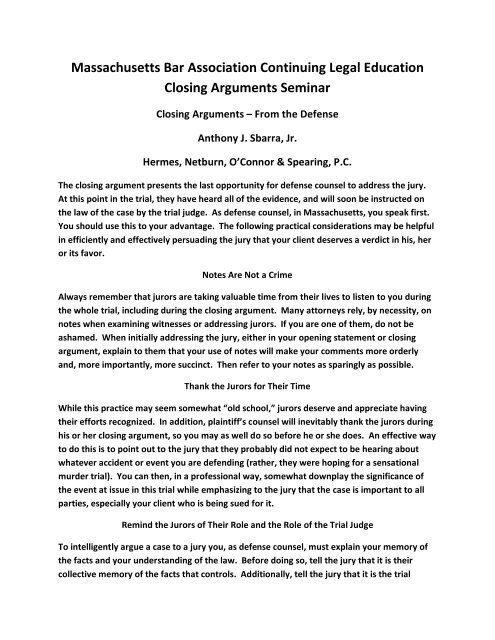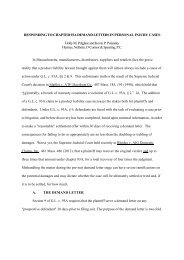From the Defense. Winning Closing Arguments Seminar - Hermes ...
From the Defense. Winning Closing Arguments Seminar - Hermes ...
From the Defense. Winning Closing Arguments Seminar - Hermes ...
You also want an ePaper? Increase the reach of your titles
YUMPU automatically turns print PDFs into web optimized ePapers that Google loves.
Massachusetts Bar Association Continuing Legal Education<br />
<strong>Closing</strong> <strong>Arguments</strong> <strong>Seminar</strong><br />
<strong>Closing</strong> <strong>Arguments</strong> – <strong>From</strong> <strong>the</strong> <strong>Defense</strong><br />
Anthony J. Sbarra, Jr.<br />
<strong>Hermes</strong>, Netburn, O’Connor & Spearing, P.C.<br />
The closing argument presents <strong>the</strong> last opportunity for defense counsel to address <strong>the</strong> jury.<br />
At this point in <strong>the</strong> trial, <strong>the</strong>y have heard all of <strong>the</strong> evidence, and will soon be instructed on<br />
<strong>the</strong> law of <strong>the</strong> case by <strong>the</strong> trial judge. As defense counsel, in Massachusetts, you speak first.<br />
You should use this to your advantage. The following practical considerations may be helpful<br />
in efficiently and effectively persuading <strong>the</strong> jury that your client deserves a verdict in his, her<br />
or its favor.<br />
Notes Are Not a Crime<br />
Always remember that jurors are taking valuable time from <strong>the</strong>ir lives to listen to you during<br />
<strong>the</strong> whole trial, including during <strong>the</strong> closing argument. Many attorneys rely, by necessity, on<br />
notes when examining witnesses or addressing jurors. If you are one of <strong>the</strong>m, do not be<br />
ashamed. When initially addressing <strong>the</strong> jury, ei<strong>the</strong>r in your opening statement or closing<br />
argument, explain to <strong>the</strong>m that your use of notes will make your comments more orderly<br />
and, more importantly, more succinct. Then refer to your notes as sparingly as possible.<br />
Thank <strong>the</strong> Jurors for Their Time<br />
While this practice may seem somewhat “old school,” jurors deserve and appreciate having<br />
<strong>the</strong>ir efforts recognized. In addition, plaintiff’s counsel will inevitably thank <strong>the</strong> jurors during<br />
his or her closing argument, so you may as well do so before he or she does. An effective way<br />
to do this is to point out to <strong>the</strong> jury that <strong>the</strong>y probably did not expect to be hearing about<br />
whatever accident or event you are defending (ra<strong>the</strong>r, <strong>the</strong>y were hoping for a sensational<br />
murder trial). You can <strong>the</strong>n, in a professional way, somewhat downplay <strong>the</strong> significance of<br />
<strong>the</strong> event at issue in this trial while emphasizing to <strong>the</strong> jury that <strong>the</strong> case is important to all<br />
parties, especially your client who is being sued for it.<br />
Remind <strong>the</strong> Jurors of Their Role and <strong>the</strong> Role of <strong>the</strong> Trial Judge<br />
To intelligently argue a case to a jury you, as defense counsel, must explain your memory of<br />
<strong>the</strong> facts and your understanding of <strong>the</strong> law. Before doing so, tell <strong>the</strong> jury that it is <strong>the</strong>ir<br />
collective memory of <strong>the</strong> facts that controls. Additionally, tell <strong>the</strong> jury that it is <strong>the</strong> trial
judge’s instructions regarding <strong>the</strong> law that controls. Explain to <strong>the</strong>m that if your rendition of<br />
<strong>the</strong> facts does not completely coincide with <strong>the</strong>irs, <strong>the</strong>y should substitute <strong>the</strong>ir memory. Also<br />
explain that if your version of <strong>the</strong> law is at any way at odds with <strong>the</strong> trial judge, he or she is<br />
absolutely right.<br />
Refer To Your Opening Statement<br />
In your opening statement, you will have outlined <strong>the</strong> important areas of disagreement in <strong>the</strong><br />
case, i.e., <strong>the</strong> defendant was not at fault and should not be blamed, or, <strong>the</strong> plaintiff was not<br />
really injured or, if injured, not as seriously as alleged. You should refer to those points<br />
repeatedly in your closing argument. Highlight <strong>the</strong> testimony of favorable witnesses and<br />
utilize any favorable exhibits. Tell <strong>the</strong> jury that in your opening you said that Mr. “so and so”<br />
was going to say “thus and such” and remind <strong>the</strong>m that he did exactly that. Also and perhaps<br />
more importantly, if any of <strong>the</strong> plaintiff’s promised evidence was not forthcoming, emphasize<br />
that as well.<br />
Explain <strong>the</strong> Burden of Proof<br />
Even in civil cases, <strong>the</strong> burden of proof is <strong>the</strong> friend of defense counsel. You should remind<br />
<strong>the</strong> jurors that in Massachusetts one cannot find “for <strong>the</strong> plaintiff” but ra<strong>the</strong>r, in order for <strong>the</strong><br />
plaintiff to recover, <strong>the</strong> jury must find “against <strong>the</strong> defendant.” This is a significant difference<br />
and must be stressed. The dramatic TV scene with a jury finding for a plaintiff is not <strong>the</strong> way<br />
it works in a Massachusetts Superior Court. In addition, with respect to questionable issues<br />
on liability or damages, you should argue to <strong>the</strong> jury that if <strong>the</strong>y cannot “figure it out,” <strong>the</strong><br />
plaintiff has failed to meet his, her or its burden, and <strong>the</strong> defendant must prevail. Put simply,<br />
<strong>the</strong>re are no ties in Superior Court.<br />
Deal With Sympathy<br />
All decent human beings, presumably including <strong>the</strong> jurors, feel sympathy. You should<br />
acknowledge this and not shy away from it. Explain to <strong>the</strong> jury that sympathy is a noble<br />
virtue, but that it has no place in <strong>the</strong> deliberating room. The jurors took an oath to follow <strong>the</strong><br />
law, and <strong>the</strong>y will be instructed to not allow sympathy to come into play. Tell <strong>the</strong>m that you<br />
have no doubt that <strong>the</strong>y can and will abide by this instruction.<br />
Try to Use <strong>the</strong> Judge’s Words<br />
Before <strong>the</strong> closing argument, you will likely have had an opportunity to discuss <strong>the</strong> trial<br />
judge’s proposed jury instructions during a charge conference. You should attempt to<br />
determine as best you are able exactly how <strong>the</strong> judge will explain <strong>the</strong> applicable principles of<br />
law to <strong>the</strong> jury. When addressing <strong>the</strong>m during your closing, you should use, to <strong>the</strong> extent you
can, <strong>the</strong> same vocabulary you expect <strong>the</strong> judge to use. For example, if you learn that <strong>the</strong><br />
judge defines negligence in a certain manner, use that definition yourself. During <strong>the</strong> jury<br />
instructions, <strong>the</strong> more often you sound like <strong>the</strong> trial judge <strong>the</strong> better.<br />
Use Exhibits<br />
While jurors pay close attention to live testimony, if <strong>the</strong>y have something in <strong>the</strong>ir hands while<br />
deliberating it may be much more persuasive. If you have favorable exhibits, use <strong>the</strong>m<br />
during your closing. Photographs are particularly impressive. If you have good ones, take<br />
<strong>the</strong>m out of <strong>the</strong> power point, blow <strong>the</strong>m up, put <strong>the</strong>m on poster board and get <strong>the</strong>m into <strong>the</strong><br />
jury room. Medical records often also contain unexpected, but favorable items. You should<br />
review <strong>the</strong> medical records submitted by <strong>the</strong> plaintiff carefully. Sometimes, explanations as<br />
to how <strong>the</strong> accident happened, while arguably inadmissible, will actually be put into evidence<br />
by <strong>the</strong> plaintiff. Should that occur, you are free to comment about <strong>the</strong>m. It is sometimes<br />
effective to resist <strong>the</strong> temptation to present ei<strong>the</strong>r <strong>the</strong> plaintiff or ano<strong>the</strong>r witness with <strong>the</strong>se<br />
types of notations during cross-examination and, ra<strong>the</strong>r, simply to refer to <strong>the</strong>m during <strong>the</strong><br />
closing. For example, if <strong>the</strong> plaintiff has described <strong>the</strong> accident to an emergency room<br />
physician in a different way than he or she has testified, you can read that record to <strong>the</strong> jury<br />
and argue that <strong>the</strong> earlier version is more credible.<br />
Explain Agreements<br />
Many times you will enter into agreements with plaintiff’s counsel with respect to <strong>the</strong><br />
admissibility of certain evidence. This often occurs with medical bills and records. If you<br />
have agreed to <strong>the</strong> admissibility of those documents, you should explain to <strong>the</strong> jury exactly<br />
what <strong>the</strong> agreement was. Tell <strong>the</strong>m that in order to save <strong>the</strong>m time you conceded that <strong>the</strong><br />
doctors and o<strong>the</strong>r medical personnel would have testified to <strong>the</strong> fair and reasonable value of<br />
<strong>the</strong> medical services rendered. Emphasize, however, that you did not agree that <strong>the</strong><br />
defendant owes <strong>the</strong> plaintiff for those services.<br />
Explain Surveillance<br />
Jurors may be somewhat justifiably, at first blush, offended by your use of surveillance<br />
materials at trial. You must diffuse this offense by explaining that <strong>the</strong> plaintiff has sued your<br />
client, wants to be paid by your client and was untruthful to boot. Explain that <strong>the</strong><br />
surveillance was performed in public places only, and acknowledge that we all have certain<br />
privacy rights.
Refer to <strong>the</strong> Special Verdict Slip<br />
Prior to <strong>the</strong> closing, you will have had <strong>the</strong> opportunity to review <strong>the</strong> special verdict slip which<br />
will be presented to <strong>the</strong> jury. Use <strong>the</strong> verdict slip while making <strong>the</strong> closing argument. Go<br />
through each question and explain why <strong>the</strong>y should all be answered in <strong>the</strong> defendant’s favor.<br />
Remind <strong>the</strong> Jury of <strong>the</strong> Bottom Line<br />
All civil suits are about money. Do not be reluctant to remind <strong>the</strong> jury of that fact. If<br />
appropriate, use <strong>the</strong> financial interest of <strong>the</strong> plaintiff to question his or her credibility. It may<br />
be appropriate to argue that no one should leave <strong>the</strong> courthouse in a better position than<br />
before <strong>the</strong> accident occurred. On <strong>the</strong> o<strong>the</strong>r hand, if some award is justified and <strong>the</strong> parties<br />
just cannot agree on value, ask <strong>the</strong> jury to be fair. Explain to <strong>the</strong>m that being fair to <strong>the</strong><br />
plaintiff will result in fairness to <strong>the</strong> defendant.



